

We’ve seen the same story play out one too many times. Whether it’s a schoolyard fight or someone in need of help, children and adults alike are more apt to reach for a smartphone and hit record than to step in to help. The unfortunate combination of video technology in the palm of our hands and social media has too many children thinking about “likes” and not enough thinking about doing the right thing.
As adults, we agree, that someone needs to somehow teach the kids civil courage and the difference between right and wrong. But how? And who? And can we really teach children to act instead of record, to help instead of turn a blind eye?
Acts Of Civil Courage We Can All Learn From
This past week, a group of teenagers here in New Jersey became heroes, when they stepped up to the plate when their school bus driver suffered a medical emergency while driving 28 students to school. Gavin Costello, 15-year-old student, helped him bring the vehicle to a stop while Angelo Mel-tos, an 18 year-old, turned off the engine after the bus had stopped and called 911, according to a news release from township police. After the bus was stopped, a 18-year-old male student turned off the engine, police said.
This story struck a chord with me because it reminded me of a personal account. I myself am a proud parent and my son is currently a freshman at Northeastern University in Boston. One night, he was waiting for his cab when he heard a screech and what he saw was a young man bolting across the street, seemingly intoxicated. A car had hit the boy and it appeared to be serious as the boy became airborne and landed on his back. My son told me he quickly hung up with the cab driver and ran to the boy to check his breath and make sure he was breathing before calling 911. The driver of the car was also a responsible citizen and arrived to the scene quickly after hearing what happened. After the initial shock, the boy didn’t seem seriously injured so they moved him to a sidewalk and waited with the boy until the ambulance arrived. Although my mind immediately went to this poor boy and his parents, I was so proud of my son for showing his civic sense and doing the right thing.
Who Should Teach Civil Courage?
Truth to be told, everyone has to play a part: the legislation has to enable children and adults to do the right thing, and parents and teachers must work together to teach students the skills to be able to identify when it is safe and appropriate to interfere in different situations. There are a variety of formalized curriculums, such as Ruby Bridges by Scholastics.
In fact, a Swiss university, The Institute of Psychology of the University of Zurich, offers a training program that promotes civil courage. The program “Small steps instead of heroic deeds” is based on the latest psychological findings on the conditions of civil courage. According to the column model, knowledge and behavior are strengthened through reflection of our own moral values and experiences related to civil courage and giving concrete behavior tips what one can do in a critical situation and what one must not do in any case among other things.
Beyond a structured framework, there is also something profound to be said for leading by example everyday. If we as parents help other people in distress, our children will intrinsically learn what the difference between right and wrong is.
What You Can Do As A Parent
It is crucial, to lead by example and be a role model for our children. If we as parents immediately shift responsibility to others and look to them to fix everything in our life, instead of standing up for ourselves and others, our children are more likely to feel they are passive bystanders and there isn’t anything they can do anyway but hit record.
In addition, you can actively teach empathy and kindness towards others which plants the seed for civil courage. As a family, you can volunteer once in awhile in soup kitchens, homeless shelters or other projects. Even the smallest acts of kindness towards our fellow human beings shows our children, we are in this together
We can all promote civil courage at home as well as in the classroom by sharing more inspirational stories like this one and less viral videos.





